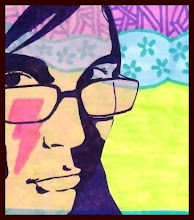
As a huge Charlie Kaufman fan, I've been waiting to see this movie for awhile. I didn't get around to seeing it in theatres, mostly because most people I know didn't seem interested, but I finally got around to renting it. I expected good things because Philip Seymour Hoffman is amazing and the rest of the cast is fantastic as well. But I have to say: this movie was weird.
Now, that's not necessarily a bad thing. I've watched and enjoyed a lot of very weird movies in my day, a lot of them Kaufman films. And this movie showed elements utilized in previous Kaufman films, particularly the likes of Being John Malkovich or Adaptation. It's instantly recognizable as something with Kaufman written all over it, and in many ways seems like a culmination of the ideas he'd been accumulating and refining with his other films. Jon Brion also does the music for this one, which is always a great touch. Kaufman and Brion go so well together.

I couldn't recommend this film to many people. In fact, I wouldn't recommend it to most people because I think most people would find it tedious, eccentric and pedantic. There is something so difficult about watching Philip Seymour Hoffman's character Caden Cottard languish and toil his entire life on something that to him is both nothing and everything at once. The role gender and age plays in the development of the plot could be jarring for most audiences and I think a lot of people would be just plain bored.
But there is one venue in which I think this movie will find a happy home, and that is from the academic perspective. From a film studies side, I don't think any movie has ever been made like this one ever. It's almost like a play within a play within a film within a film. For those well versed in postmodern slang, it's essentially a "metametafilm on metametatheatre" and that is saying a lot.

The other element, which may only appeal to me and other Comparative Literature/Theatre/German nerds (so, well, me and my friend Katie), is that I've never seen a movie that reminded me so much of Bertolt Brecht's "epic theatre" or "episches theater". Epic theatre, as opposed to dramatic theatre, is defined loosely as theatre in which all natural and realistic elements are removed such that the audience is unable to identify with the characters or the story. To explain it succinctly, as this website from Oregon State explains:
The dramatic theater's spectator says: Yes, I have felt like that too-- Just like me--It's only natural-- It'll never change--The sufferings of this man appall me, because they are inescapable--That's great art; it all seems the most obvious thing in the world--I weep when they weep, I laugh when they laugh.
The epic theater's spectator says: I'd never have thought it -- That's not the way -- That's extraordinary, hardly believable -- It's got to stop -- The sufferings of this man appall me, because they are unnecessary -- That's great art; nothing obvious in it -- I laugh when they weep, I weep when they laugh.
The epic theater's spectator says: I'd never have thought it -- That's not the way -- That's extraordinary, hardly believable -- It's got to stop -- The sufferings of this man appall me, because they are unnecessary -- That's great art; nothing obvious in it -- I laugh when they weep, I weep when they laugh.
The characters within the movie create a play much like epic theatre not just in its size and scope (a scale model of an entire town) but also in that their characters can be boiled down to singular actions or mindsets, much like Brecht's gestus. Everything seems terribly fragmented and disconnected from its proper place in space or time throughout the film, and this effect makes you constantly aware that you are just watching a constructed story rather than a singular plot. This detachment from the story, awareness of construct was central to Epic Theatre (or "Dialectical Theatre," as Brecht preferred) because it allows for a creative dissonance between the space of the story and the audience.
So anyway, this is not a film I would recommend on the whole. But if you're fascinated to see something different, to see something like what Brecht might do if he were a postmodern filmmaker, then definitely check out Synecdoche, New York.





















